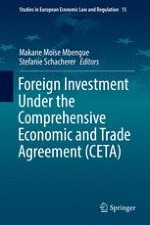This book analyzes the investment chapter of a new type of trade agreement between Canada and the European Union to help readers gain a better understanding of this mega-regional deal, which includes foreign investment protection. It first provides background information on the Comprehensive Economic and Trade Agreement (CETA), particularly focusing on the chapter on foreign investment, including the rules on the entry of investments, their protection and the stringent dispute settlement mechanism.
It goes on to explore whether these provisions are a further step toward reforming the current international investment law regime. It also examines the highly innovative part of the agreement: the inclusion of crosscutting issues, such as sustainable development. In addition, it examines the CETA investment chapter from the perspective of non-contracting parties, including Africa, Asia and Latin America.
The book is of interest to academics and students in the field of international investment law. It is also an essential resource for government legal advisers, policymakers, business practitioners, and others dealing with international investment law.
